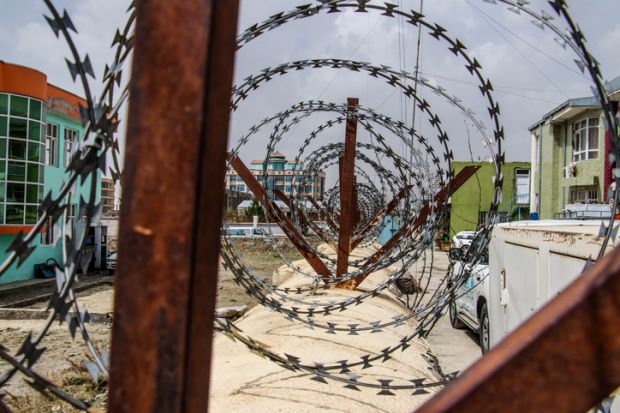Afghan scholars previously employed as contractors with the British Council have pleaded with the UK government to urgently process their applications for asylum.
The 22 academics in Afghan universities say they have been “abandoned in life-threatening circumstances”, in an open letter seen by Times Higher Education.
In their message to MPs, including home secretary Priti Patel, the anonymous authors say that months after the Taliban took over their country, they are still waiting to hear back from the UK government on their applications to the Afghan Relocation and Assistance Programme (ARAP).
They said that the most recent communication via the British Council from the UK government suggests they could be waiting for several more weeks or months before they receive a response on their cases.
“Our situation is desperate. We are devastated by this latest message. How long does it take to process 22 applications?” ask the authors.
The scholars claim that some of them applied to the ARAP scheme in April, only to receive a second request to submit paperwork in September, followed by yet another.
“We were asked, for the third time, to apply again. So far, most of us have not even received an ARAP case number,” they write.
Their letter also includes personal observations from individual scholars in the group, who warn of grave danger to themselves and their families if they remain in the country for much longer. Numerous academics claim they have witnessed violence and tell of the Taliban going door to door in search of people associated with foreign groups.
“I frequently change my location as the Taliban are now searching for any foreign agency workers, especially UK and US workers,” says one scholar.
“The Taliban are tricking people,” another writes. “They phone the people and tell them that there is an evacuation (relocation) programme. They are asked for their home address. Then the Taliban go to those addresses and kill them.”
Some of the scholars appealed to the British Council directly.
“I never imagined that we would experience such a sad fate just because we were employees of the British Council. My family insists that I flee the country in any way that I can, but there is no safe way,” according to one statement.
The British Council told THE that to date, all its Afghan employees whose paperwork has been processed under the ARAP scheme have been successful in their applications. It said that 12 former Afghan contractors along with 29 dependents have already been relocated to the UK or are en route.
Another 21 contractors and 70 dependents have also been approved for the scheme “subject to necessary checks” and a further 175 contractors are eligible for the scheme.
Scott McDonald, chief executive of the British Council said that “whilst we fully recognise that the applications of our former Afghan colleagues have not progressed with the urgency they deserve, we reject the idea that we have in any way abandoned them”.
“We too are very frustrated at how long their ARAP approvals are taking…we continue to work tirelessly on their behalf to press for a speedy resolution,” he said.
A government spokesperson said that the evacuation from Afghanistan had been the UK’s “biggest and fastest” in recent history. “We continue to do all we can to enable British nationals and eligible Afghans to leave the country,” they added.




